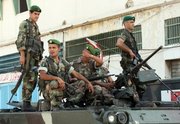 TRIPOLI, Lebanon (AFP) – Tension ran high in north Lebanon’s capital of Tripoli on Sunday even as the army was deployed in force a day after a man died in an apartment block explosion. A security official told AFP that a tobacco shop run by an Alawite was set ablaze in the mainly Sunni district of Bab al-Tebbaneh, the scene of Saturday’s blast in which 20 people were also wounded and several homes damaged. Civil defence workers put out the fire before it could spread to other businesses, the official said, declining to be named. The latest incident took place despite the deployment over the past week of army and interior ministry forces in the port city since deadly clashes between Sunnis and members of the Alawite community, an offshoot of Shiite Islam.
TRIPOLI, Lebanon (AFP) – Tension ran high in north Lebanon’s capital of Tripoli on Sunday even as the army was deployed in force a day after a man died in an apartment block explosion. A security official told AFP that a tobacco shop run by an Alawite was set ablaze in the mainly Sunni district of Bab al-Tebbaneh, the scene of Saturday’s blast in which 20 people were also wounded and several homes damaged. Civil defence workers put out the fire before it could spread to other businesses, the official said, declining to be named. The latest incident took place despite the deployment over the past week of army and interior ministry forces in the port city since deadly clashes between Sunnis and members of the Alawite community, an offshoot of Shiite Islam.
Armoured vehicles were posted at entrances to Bab al-Tebbaneh and two other densely populated districts, Jabal Mohsen and Al-Qobbe, where nine people were killed in sectarian clashes on June 22 and 23. It was still not publicly known on Sunday what caused Saturday’s explosion which killed a local resident with no known political affiliation. Almost 500 people went to the victim’s funeral which was also attended by dozens of armed militants, some wearing black headbands and chanting Koranic verses in praise of martyrdom. Lebanon’s Sunni mufti, Mohammed Rashid Qabbani, condemned the explosion as a "criminal act aimed at spreading sedition," and urged all politicians to help Prime Minister Fuad Siniora in his protracted efforts to form a new government. Residents of Bab al-Tebbaneh who support the Western-backed majority in parliament have clashed repeatedly with Alawites in the nearby Jabal Mohsen district who backs hizbollah. Later on Saturday, three grenades exploded in Bab al-Tebbaneh over a half-hour period but no one was injured and no buildings were damaged, security officials said.
And two men were wounded on Friday night in Tripoli when a grenade went off, an army spokesman said, adding that one lost a leg in the blast. The Tripoli clashes have raised fears of a nationwide security breakdown amid protracted efforts by Siniora to form a national unity cabinet since a Qatari-brokered deal in May to end an 18-month political crisis. Rival factions continue to bicker over the distribution of key portfolios in a new 30-member government. The deal was struck after at least 65 people were killed in May in sectarian clashes that saw Hezbollah stage a spectacular takeover of mainly Sunni areas of west Beirut.
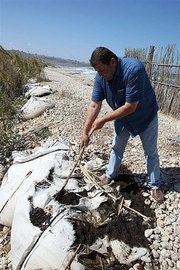 BEIRUT (AFP) – Two years after the worst oil spill in the east Mediterranean left thousands of tonnes of crude over three-quarters of Lebanon’s coast, the beaches are almost all clean but the troubles continue. In July 2006, in the midst of the month-long war between
BEIRUT (AFP) – Two years after the worst oil spill in the east Mediterranean left thousands of tonnes of crude over three-quarters of Lebanon’s coast, the beaches are almost all clean but the troubles continue. In July 2006, in the midst of the month-long war between 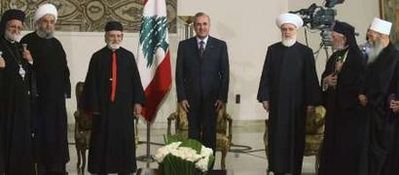 President General Michel Suleiman spoke at a meeting of Lebanon’s top 15 Christian and Muslim religious leaders, who convened at the
President General Michel Suleiman spoke at a meeting of Lebanon’s top 15 Christian and Muslim religious leaders, who convened at the 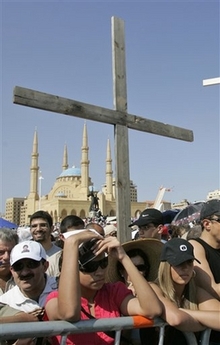 Daily Star – BEIRUT: Miraculous, perhaps. Tens of thousands of Lebanese gathered in Martyrs Square in Downtown Beirut on Sunday to witness the beatification of Yaaqoub Haddad, the late Capuchin priest who gained fame for his prolific work in founding an order of nuns, expanding the Capuchin school network and conceiving or establishing a number of religious and social institutions, some of which have gained iconic status in Lebanon. Haddad, who died more than 50 years ago, took a step toward sainthood in the first beatification ever to take place outside the Vatican – and people flocked to the capital to observe the ceremony.
Daily Star – BEIRUT: Miraculous, perhaps. Tens of thousands of Lebanese gathered in Martyrs Square in Downtown Beirut on Sunday to witness the beatification of Yaaqoub Haddad, the late Capuchin priest who gained fame for his prolific work in founding an order of nuns, expanding the Capuchin school network and conceiving or establishing a number of religious and social institutions, some of which have gained iconic status in Lebanon. Haddad, who died more than 50 years ago, took a step toward sainthood in the first beatification ever to take place outside the Vatican – and people flocked to the capital to observe the ceremony. 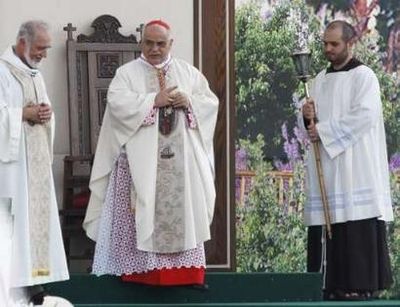 highest honors in the Christian tradition upon a Lebanese priest mere meters away from an Ottoman-era mosque in the heart of the capital. Indeed, while respectful or appreciative clapping often arose, the loudest rounds of applause came after "the nation" or the "Lebanese cedars" were mentioned in one context or another. A procession of the cross was held before Western Catholic – Latinized – renditions of Syriac and Arabic Christian chants held the massive gathering rapt. As Cardinal Martins read out a message from the pope, "hoping that this beatification will lift Father Yaaqoub of Ghazir as a happy servant of the Lord," a white veil cloaking a portrait of the late priest was lifted, symbolizing recognition of Haddad’s beatification.
highest honors in the Christian tradition upon a Lebanese priest mere meters away from an Ottoman-era mosque in the heart of the capital. Indeed, while respectful or appreciative clapping often arose, the loudest rounds of applause came after "the nation" or the "Lebanese cedars" were mentioned in one context or another. A procession of the cross was held before Western Catholic – Latinized – renditions of Syriac and Arabic Christian chants held the massive gathering rapt. As Cardinal Martins read out a message from the pope, "hoping that this beatification will lift Father Yaaqoub of Ghazir as a happy servant of the Lord," a white veil cloaking a portrait of the late priest was lifted, symbolizing recognition of Haddad’s beatification. 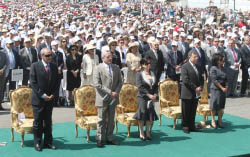 "The righteous will shine like the sun in the kingdom of their father," the Maronite patriarch said as he took the pulpit, evoking reverent silence through the assembled thousands. "The hope of so many Lebanese was realized today – that hope was the raising of Father Yaaqoub’s portrait above the altar of the Catholic Church." Sfeir then outlined how Haddad "passed through the narrow door leading to sainthood," attributing the priest’s ability to walk "the difficult road of a saintly life to three virtuous practices: surrender to the will of God, Christian modesty and the work of mercy." "Father Yaaqoub would say that ‘All God has given me belongs to Him and the poor of Lebanon," added Sfeir, in reference to his first point regarding the late pastor. "He built hospitals, schools and took care of the sick, yet he was a man of simple means – Father Yaaqoub put his trust in the grace of God." Sfeir, describing the four "pillars of modesty" that characterized Haddad’s life, again quoted the priest, saying: "Do not bestow virtue upon yourself that is not present within you; credit the Lord for that which is good in us; do not praise yourself in the presence of others; and do not count the shortcomings of those close to you in order to raise yourself."
"The righteous will shine like the sun in the kingdom of their father," the Maronite patriarch said as he took the pulpit, evoking reverent silence through the assembled thousands. "The hope of so many Lebanese was realized today – that hope was the raising of Father Yaaqoub’s portrait above the altar of the Catholic Church." Sfeir then outlined how Haddad "passed through the narrow door leading to sainthood," attributing the priest’s ability to walk "the difficult road of a saintly life to three virtuous practices: surrender to the will of God, Christian modesty and the work of mercy." "Father Yaaqoub would say that ‘All God has given me belongs to Him and the poor of Lebanon," added Sfeir, in reference to his first point regarding the late pastor. "He built hospitals, schools and took care of the sick, yet he was a man of simple means – Father Yaaqoub put his trust in the grace of God." Sfeir, describing the four "pillars of modesty" that characterized Haddad’s life, again quoted the priest, saying: "Do not bestow virtue upon yourself that is not present within you; credit the Lord for that which is good in us; do not praise yourself in the presence of others; and do not count the shortcomings of those close to you in order to raise yourself." 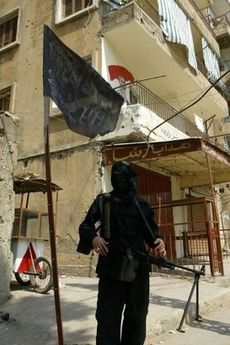 by Omar Ibrahim, TRIPOLI, Lebanon (AFP) – Four people were killed and at least 33 others wounded in north Lebanon on Sunday in clashes between armed opponents and supporters of the parliamentary majority, security officials said. After a lull of several hours, the two sides traded fire with Kalashnikov
by Omar Ibrahim, TRIPOLI, Lebanon (AFP) – Four people were killed and at least 33 others wounded in north Lebanon on Sunday in clashes between armed opponents and supporters of the parliamentary majority, security officials said. After a lull of several hours, the two sides traded fire with Kalashnikov 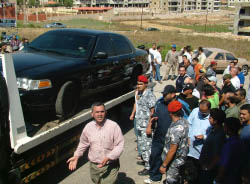 By Michael Bluhm, BEIRUT: Israel’s Wednesday offer of direct peace talks with Lebanon amounts to little more than a ploy in domestic Israeli politics and a sop to US interests in the region without any hope for success, a number of analysts told The Daily Star. Israeli Prime Minister Ehud Olmert has undertaken a flurry of diplomatic activity recently, with the disclosure last month of indirect Israeli-Syrian negotiations brokered by Turkey and the announcement on Tuesday of a six-month cease-fire with Hamas in Gaza, but his approval ratings have been at historic lows since Israel’s debacle in the summer 2006 war here. Olmert’s political epitaph may well have been written by the court testimony last month of an American businessman who said he loaded Olmert with cash-stuffed envelopes totaling more than $150,000 when the prime minister was mayor of Occupied Jerusalem. With Olmert’s political fortunes nearly bankrupt, Wednesday’s invitation for direct talks with Lebanon aims partly to deflect attention from his domestic difficulties, said political analyst Simon Haddad.
By Michael Bluhm, BEIRUT: Israel’s Wednesday offer of direct peace talks with Lebanon amounts to little more than a ploy in domestic Israeli politics and a sop to US interests in the region without any hope for success, a number of analysts told The Daily Star. Israeli Prime Minister Ehud Olmert has undertaken a flurry of diplomatic activity recently, with the disclosure last month of indirect Israeli-Syrian negotiations brokered by Turkey and the announcement on Tuesday of a six-month cease-fire with Hamas in Gaza, but his approval ratings have been at historic lows since Israel’s debacle in the summer 2006 war here. Olmert’s political epitaph may well have been written by the court testimony last month of an American businessman who said he loaded Olmert with cash-stuffed envelopes totaling more than $150,000 when the prime minister was mayor of Occupied Jerusalem. With Olmert’s political fortunes nearly bankrupt, Wednesday’s invitation for direct talks with Lebanon aims partly to deflect attention from his domestic difficulties, said political analyst Simon Haddad. 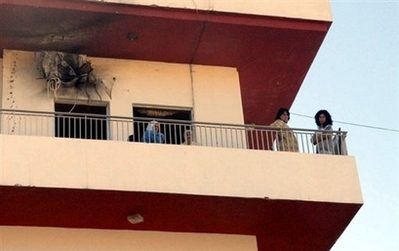 by Hassan Jarrah
by Hassan Jarrah 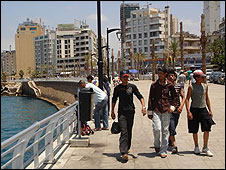 By Mike Sergeant, They call it the "miracle of Lebanon" – the ability of this country to bounce back after a devastating war or political crisis. Only last month, violence erupted on the streets of Beirut. Lebanon seemed to be bracing for another civil war. But within weeks of a peace deal being signed in Doha, a president has finally been elected and tourists are returning to the Lebanese capital. Once again, the evenings are filled with the sound of young people having fun and music blaring from Beirut’s numerous bars and cafes. In some countries, it would take years for confidence and optimism to return after such a period of intense uncertainty. Not here. The Lebanese take huge pride in their ability to be crying one minute, and laughing the next.
By Mike Sergeant, They call it the "miracle of Lebanon" – the ability of this country to bounce back after a devastating war or political crisis. Only last month, violence erupted on the streets of Beirut. Lebanon seemed to be bracing for another civil war. But within weeks of a peace deal being signed in Doha, a president has finally been elected and tourists are returning to the Lebanese capital. Once again, the evenings are filled with the sound of young people having fun and music blaring from Beirut’s numerous bars and cafes. In some countries, it would take years for confidence and optimism to return after such a period of intense uncertainty. Not here. The Lebanese take huge pride in their ability to be crying one minute, and laughing the next. 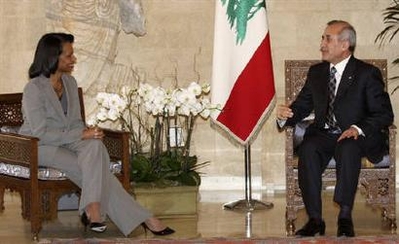 BEIRUT (AFP) – US Secretary of State Condoleezza Rice made an unannounced visit to Lebanon on Monday to bolster the troubled country’s new president, as rival politicians still struggle to form a new government. Rice said she made her lightning trip to "express the United States’ support for
BEIRUT (AFP) – US Secretary of State Condoleezza Rice made an unannounced visit to Lebanon on Monday to bolster the troubled country’s new president, as rival politicians still struggle to form a new government. Rice said she made her lightning trip to "express the United States’ support for 


